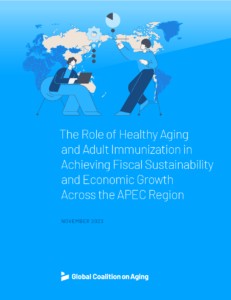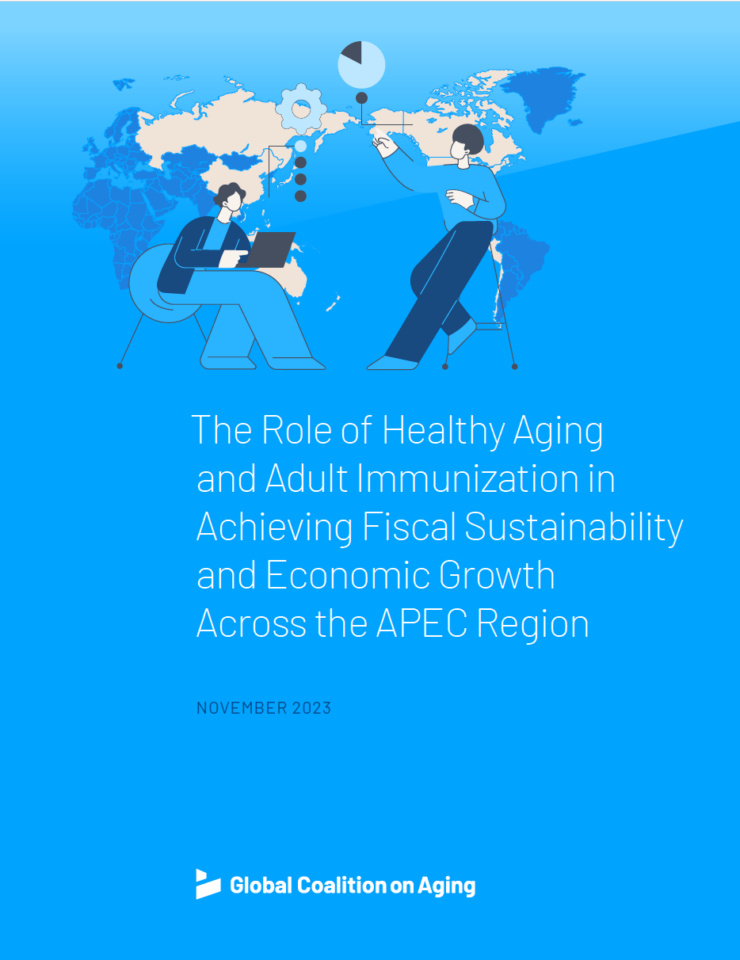The report, released as government and business leaders come together for APEC Economic Leaders’ Week, calls for targeted actions to meet both health and economic goals for the region.
 New York, NEW YORK (November 9, 2023) – As leaders from across the Asia-Pacific Economic Cooperation (APEC) region convene in San Francisco over the next week, a new report from the Global Coalition on Aging (GCOA) points to investments in healthy aging as a growing economic imperative amid the region’s changing demographics. According to the new report, programs that keep populations healthy, active, and productive – like adult immunization – are increasingly becoming a prerequisite for economic stability and growth.
New York, NEW YORK (November 9, 2023) – As leaders from across the Asia-Pacific Economic Cooperation (APEC) region convene in San Francisco over the next week, a new report from the Global Coalition on Aging (GCOA) points to investments in healthy aging as a growing economic imperative amid the region’s changing demographics. According to the new report, programs that keep populations healthy, active, and productive – like adult immunization – are increasingly becoming a prerequisite for economic stability and growth.
“An estimated 630 million people over the age of 60 live in APEC economies, which are at the leading edge of a global demographic shift,” said Mike Hodin, CEO of the Global Coalition on Aging. “As the region ages, leaders are recognizing the impact of investments in healthy aging on economic productivity and sustainability,” said Hodin.
The new GCOA report highlights adult immunization programs, in particular, as an important opportunity for APEC economies to invest in healthy aging, given the dual connection between immunization and increased workforce participation and economic activity on one side and decreased healthcare system utilization and spending, on the other.
APEC economies have already taken steps to prioritize immunization for adults, notably through the introduction, in 2021, of a 10-year Action Plan on Vaccination Across the Life-Course and last year’s launch of a dashboard to measure progress. Yet, more than two years in, the economies have shown variable commitment to the Action Plan. In order to realize the Action Plan, all APEC economies should be committing to national immunization program across the life course with clear recommendations for implementation.
The GCOA report draws on data from across the APEC economies, including newly published research from the International Longevity Centre-Singapore, a Tsao Foundation initiative, which highlights the need for APEC leaders to strengthen their existing immunization efforts through widespread awareness-raising at the community level and leveraging existing resources within communities to better reach older adults.
As APEC leaders look to ensure continued economic growth and both fiscal and health system sustainability, the GCOA report outlines four key action areas to support these goals:
- Prioritize prevention for older adults, including through robust national immunization programs to increase vaccine uptake.
- Invest in health education and awareness-raising for older adults and those they trust.
- Integrate immunization programs into community-based programs, resources, and health systems.
- Quantify the costs of vaccine-preventable diseases and the returns on investment in prevention and immunization to support evidence-based decisionmaking.
“We commend the valuable work that APEC leaders have initiated to strengthen immunization across the life course, while recognizing the need for more and targeted actions to build on this work,” said Mike Hodin, CEO of the Global Coalition on Aging. “Now, with even clearer evidence from the International Longevity Centre-Singapore and their latest research, we hope APEC leaders prioritize healthy longevity through impactful policies to help meet their adult immunization goals.
 Global Coalition On
Global Coalition On 